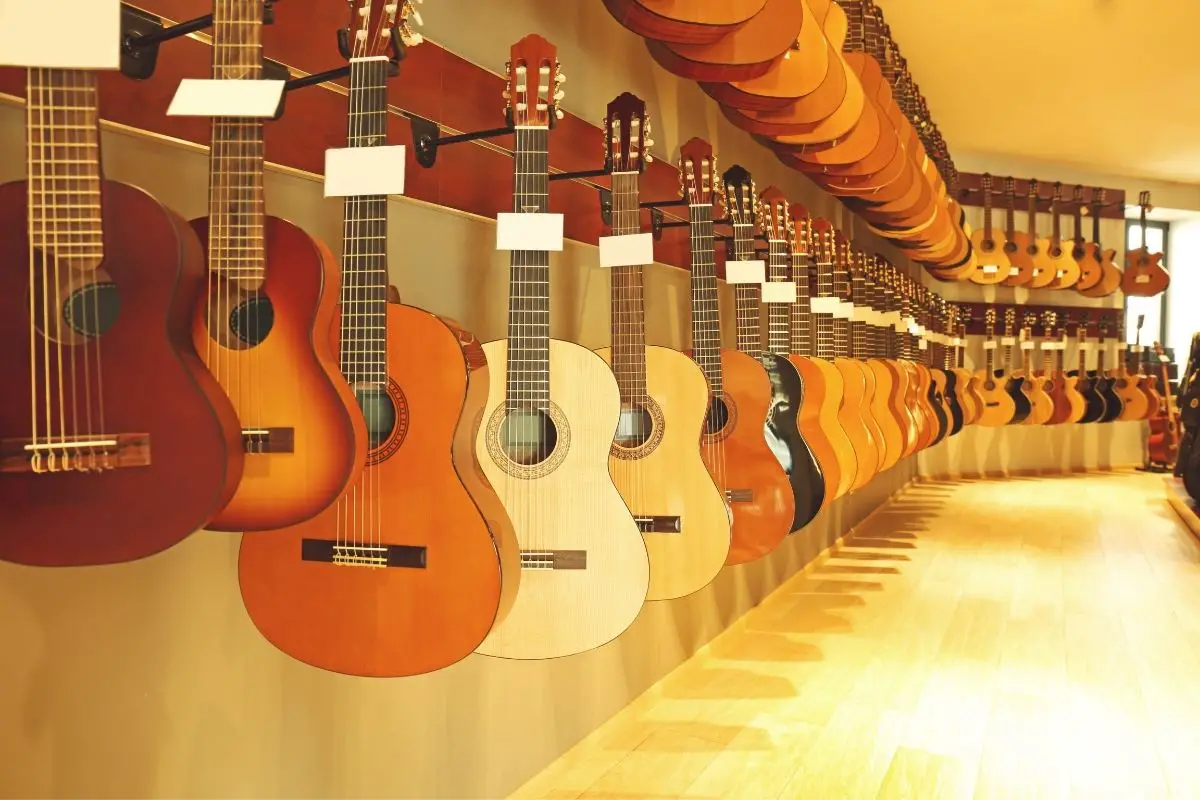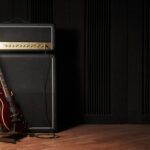Seven-string guitars have long been associated with heavy metal music, but are they really just for metal?
While it’s true that many metal guitarists use seven-string guitars to achieve the low-end rumble and extended range necessary for their music, the truth is that these instruments have a wider range of applications than many people realize.
Understanding the history and evolution of the seven-string guitar, as well as its role in different genres, can help shed light on the versatility of this instrument.
The seven-string guitar has been around for over a century, but it wasn’t until the 1990s that it really took off in popularity. This was largely due to the rise of metal bands that used the instrument to achieve a heavier, more aggressive sound.
However, the seven-string guitar has also been used in jazz, fusion, and other genres, where its extended range can be used to create complex chord voicings and melodic lines.
Understanding the different ways in which the seven-string guitar can be used can help players and listeners alike appreciate the instrument’s versatility.
Key Takeaways on Are 7-String Guitars Just for Metal?
- Seven-string guitars are often associated with heavy metal, but they have a wider range of applications than many people realize.
- Understanding the history and evolution of the seven-string guitar, as well as its role in different genres, can help shed light on the instrument’s versatility.
- The seven-string guitar has been used in jazz, fusion, and other genres, where its extended range can be used to create complex chord voicings and melodic lines.
You will also like these other top picks in this category:
- Best Budget 7 String Guitar of 2023
- Is it OK to Start on a 7 String Guitar?
- How to Choose a 7 String Guitar?
Understanding 7-String Guitars

7-string guitars have become increasingly popular in recent years, especially in the metal genre. However, they are not exclusively for metal and can be used in various genres. A 7-string guitar is simply a guitar with an additional low string, typically tuned to a B or A note.
One of the main differences between a 7-string guitar and a standard 6-string guitar is the scale length. The scale length of a 7-string guitar is typically longer than a standard guitar to accommodate the additional string. This longer scale length can affect the string tension and intonation of the guitar.
When playing chords on a 7-string guitar, the additional low string can add depth and richness to the sound. However, it can also make some chord shapes more challenging to play. It is important to experiment with different chord shapes and fingerings to find what works best for the player.
String tension is also an important factor to consider when playing a 7-string guitar. The additional string can increase the overall tension on the guitar, which can affect the playability and tone.
It is recommended to use heavier gauge strings and adjust the truss rod and bridge accordingly to ensure proper string tension.
Lastly, intonation can be a challenge on a 7-string guitar due to the longer scale length and additional string. It is important to regularly check and adjust the intonation to ensure accurate tuning across all strings.
History and Evolution
The history of 7-string guitars dates back to the early 19th century, where some guitarists experimented with adding an extra string to their instruments.
However, it wasn’t until the 1990s that 7-string guitars gained popularity, thanks to the efforts of companies like Ibanez and musicians like Steve Vai.
Ibanez introduced the UV7, also known as the Universe model, in 1990. This guitar was a collaboration between Ibanez and Steve Vai, and it quickly became popular among metal guitarists.
The UV7 had a seven-string configuration, with the additional string tuned to a low B, which gave guitarists access to a wider range of notes.
The popularity of 7-string guitars continued to grow throughout the 1990s, with other guitar manufacturers like Schecter, Jackson, and ESP introducing their own 7-string models.
The 7-string guitar became a staple in the metal genre, but it also found its way into other genres like jazz and fusion.
The evolution of 7-string guitars continued into the 2000s, with advancements in technology and manufacturing. Today, 7-string guitars are more accessible than ever before, with a wide range of options available at different price points.
Role in Different Genres

While 7-string guitars are often associated with heavy metal and its sub-genres, they can be used in a variety of musical genres. In fact, many guitarists in jazz, fusion, and progressive rock have adopted the 7-string guitar for its extended range and versatility.
In jazz, the 7-string guitar is often used for chord melody playing, where the guitarist plays both the melody and chords simultaneously.
The additional low B string allows for more complex chord voicings and bass lines. Jazz guitarists such as George Van Eps, Bucky Pizzarelli, and Howard Alden have all used 7-string guitars in their playing.
In fusion and progressive rock, the 7-string guitar has become popular for its ability to handle complex and heavy chord progressions.
Guitarists such as Steve Vai, John Petrucci, and Tosin Abasi have all used 7-string guitars in their music, incorporating techniques such as tapping, sweep picking, and alternate picking to create intricate and virtuosic solos.
While 7-string guitars are commonly associated with metal, they have also found a place in subgenres such as djent and nu-metal. These genres often feature heavily distorted guitar tones and complex rhythms, which the extended range of the 7-string guitar can accommodate.
Famous 7-String Guitarists and Bands
The 7-string guitar has become increasingly popular in recent years, particularly in the metal genre. Here are some famous guitarists and bands that have incorporated the instrument into their music:
1. Korn
Korn is often credited with popularizing the 7-string guitar in the metal world. Guitarist James “Munky” Shaffer has been using 7-string guitars since the early 1990s, and the band’s heavy, downtuned sound has influenced countless other metal acts.
2. Periphery
Periphery is a progressive metal band that is known for their complex compositions and technical prowess. Guitarist Misha Mansoor is a master of the 7-string guitar and has helped to push the instrument’s capabilities to new heights.
3. Dream Theater

Dream Theater is a progressive metal band that has been around since the 1980s. Guitarist John Petrucci is one of the most respected guitarists in the world, and he has been using 7-string guitars in his playing since the mid-1990s.
4. Meshuggah
Meshuggah is a Swedish metal band that is known for their unique blend of complex rhythms and heavy grooves. Guitarist Fredrik Thordendal is a master of the 7-string guitar, and his playing has been a major influence on the modern metal scene.
5. Brian Welch
Brian “Head” Welch is a guitarist who is best known for his work with the band Korn. He has been using a 7-string guitar since the early 2000s, and his heavy, downtuned playing has helped to define the sound of modern metal.
6. Cannibal Corpse
Cannibal Corpse is a legendary death metal band that has been around since the late 1980s. Guitarist Pat O’Brien has been using a 7-string guitar in his playing since 2002, and his technical proficiency has helped to push the boundaries of the genre.
7. Fear Factory
Fear Factory is a pioneering industrial metal band that has been around since the early 1990s. Guitarist Dino Cazares is known for his heavy, downtuned playing, and he has been using a 7-string guitar since the mid-1990s.
8. Morbid Angel
Morbid Angel is a legendary death metal band that has been around since the early 1980s. Guitarist Trey Azagthoth is a master of the 7-string guitar, and his technical proficiency has helped to shape the sound of modern metal.
9. Matt Heafy
Matt Heafy is the guitarist and lead vocalist of the metal band Trivium. He has been using a 7-string guitar in his playing since the mid-2000s, and his technical proficiency and songwriting skills have helped to make Trivium one of the most respected bands in the metal world.
Tuning and Playing Techniques

When it comes to playing a 7-string guitar, tuning is a crucial aspect that can greatly affect the range and sound of the instrument.
The standard tuning for a 7-string guitar is B-E-A-D-G-B-E, which provides an extended range of notes compared to a 6-string guitar. This allows for a wider range of scales, riffs, solos, and arpeggios to be played.
One popular tuning for 7-string guitars is Drop A tuning, which lowers the pitch of the lowest string to an A. This tuning is commonly used in metal music and allows for heavy, low-end riffs to be played with ease.
However, it is important to note that Drop A tuning can put additional stress on the guitar neck and may require a thicker gauge string to maintain proper tension.
Another technique commonly used in metal music is B Standard tuning, which is a whole step lower than standard tuning. This tuning provides a darker, heavier sound and allows for easier playing of power chords and lower register riffs.
Playing techniques on a 7-string guitar can vary depending on the tuning and style of music being played. For example, in metal music, palm muting and alternate picking are commonly used to achieve a heavy, aggressive sound.
Sweep picking and tapping techniques can also be used to create fast, complex solos and arpeggios.
Popular 7-String Guitar Brands and Models
7-string guitars have become increasingly popular in the metal genre, but they are not limited to it. Many guitarists in different genres have embraced the extended range of the 7-string guitar. Here are some popular brands and models of 7-string guitars:
1. Ibanez

Ibanez is one of the most popular brands when it comes to 7-string guitars. They offer a wide range of models for different levels of players. Some of their popular models include the RG7421, RG752AHM, and the RG1070PBZ.
2. Jackson
Jackson is another brand that has a strong presence in the 7-string guitar market. They have a reputation for producing high-quality guitars that are great for shredding. Some of their popular models include the Soloist SL7 and the Pro Series Dinky DK7.
3. Schecter
Schecter is a brand that is known for producing guitars with a heavy sound. They have a wide range of 7-string guitars that cater to different styles of playing. Some of their popular models include the Hellraiser C-7 and the Banshee Elite-7.
4. PRS
PRS is a brand that is known for producing high-end guitars. They have a few 7-string models that are popular among guitarists. The SE Mark Holcomb and the SE Mark Holcomb SVN are two of their popular models.
5. Ernie Ball
Ernie Ball is a brand that is known for producing guitars that are great for playing metal. They have a few 7-string models that are popular among guitarists. The Music Man JP7 and the Sterling by Music Man JP70 are two of their popular models.
6. ESP LTD
ESP LTD is a brand that is known for producing guitars that are great for playing metal. They have a few 7-string models that are popular among guitarists. The Eclipse EC-1007 Evertune is one of their popular models.
7. Ibanez Gio GRG7221QA
The Ibanez Gio GRG7221QA is a budget-friendly 7-string guitar that is great for beginners. It has a comfortable neck and a versatile sound.
Materials and Construction

When it comes to 7-string guitars, the materials and construction play a crucial role in determining the sound and overall quality of the instrument. Most 7-string guitars are made of similar materials to their 6-string counterparts, but with some variations to accommodate the extra string.
One popular material used in the construction of 7-string guitars is mahogany. This wood is known for its warm tone and sustain, making it a popular choice for both the body and neck of the guitar.
Another common material used in the construction of 7-string guitars is maple, often used for the top of the guitar or as a veneer. Quilted maple veneer is also a popular choice for its aesthetic appeal.
Swamp ash is another popular choice for 7-string guitars, known for its bright and snappy tone. American basswood is also commonly used, known for its balanced tone and lightweight properties.
Panga Panga, a dense and heavy African hardwood, is also sometimes used for the fretboard of 7-string guitars.
In terms of construction, 7-string guitars often have a longer scale length to accommodate the extra string. This can result in a tighter feel and improved intonation.
The neck of a 7-string guitar may also be wider to allow for the extra string, which can take some getting used to for players accustomed to 6-string guitars.
Pickups and Electronics
When it comes to 7-string guitars, pickups and electronics play a crucial role in shaping the tone and sound of the instrument. The pickups are responsible for converting the string vibrations into electrical signals that are then amplified and heard through the speakers.
Many metal guitarists prefer high-output pickups that can handle the heavy distortion and low-tuned frequencies associated with the genre. The DiMarzio Blaze pickups are a popular choice among metal players, known for their clarity and tight low-end response.
Another popular option is the Seymour Duncan Alpha and Omega humbucker set, which was designed in collaboration with guitarist Mark Holcomb of Periphery. The Alpha humbucker offers a clear and balanced tone, while the Omega humbucker provides a higher output and more aggressive sound.

In addition to pickups, the electronics of a 7-string guitar can also affect the overall sound. Active pickups, which require a battery to power the preamp, can provide a stronger and more focused tone compared to passive pickups.
Ultimately, the choice of pickups and electronics depends on the player’s personal preference and the style of music they play. While 7-string guitars are often associated with metal, they can be used in a variety of genres and styles.
Understanding Market and Pricing
When it comes to 7-string guitars, the market and pricing can be a bit tricky to navigate. While they are often associated with metal music, they can be used in a variety of genres. As a result, the pricing and availability of 7-string guitars can vary depending on the market.
In terms of pricing, 7-string guitars can range from affordable to high-end. The price can be influenced by factors such as the materials used, the production process, and the manufacturer.
For example, a guitar made with high-quality woods and crafted by a well-known manufacturer will likely cost more than a guitar made with lower-quality materials and produced in a mass-market setting.
When it comes to the market, 7-string guitars are becoming more popular and accessible. While they were once considered a niche product, many manufacturers now offer 7-string models in their lineup. This has led to increased competition and a wider range of options for consumers.
For those looking for an affordable option, there are now many budget-friendly 7-string guitars available. These guitars may not have the same level of craftsmanship or high-end materials as more expensive models, but they can still offer a great playing experience for those on a budget.
In terms of production, some manufacturers may produce 7-string guitars in smaller quantities, which can drive up the price. However, others may produce them in larger quantities, which can make them more affordable and accessible.
For those who are interested in alternative options, there are also 8-string and 9-string guitars available. These guitars offer even more range and versatility, but may not be as widely available or affordable as 7-string guitars.
Maintenance and Accessories

Maintaining a 7-string guitar is essential to keep it in top condition and ensure longevity. Regular maintenance includes cleaning the guitar, changing strings, and adjusting the truss rod.
Scale length is an essential aspect to consider when purchasing a 7-string guitar. The longer scale length can lead to increased tension on the neck and strings, which can cause intonation issues. It is important to adjust the truss rod to compensate for the added tension and maintain proper intonation.
Locking tuners are a great accessory to consider for a 7-string guitar. They provide better tuning stability and make string changes easier and faster. Locking tuners also eliminate the need for string windings, which can cause tuning issues.
The Evertune bridge is another accessory that can help maintain tuning stability. It uses a unique spring system to keep the strings in tune, even with changes in temperature and humidity. The Evertune bridge is a popular choice for guitarists who play 7-string guitars in live performances.
A hardshell case or gig bag is essential to protect a 7-string guitar during transport. A hardshell case provides better protection from impacts and temperature changes, while a gig bag is more convenient for carrying the guitar around.
A fixed bridge is another option to consider when purchasing a 7-string guitar. It provides better tuning stability and sustain compared to a tremolo bridge. However, it can limit the range of pitch bends and other effects that can be achieved with a tremolo bridge.
Conclusion
7-string guitars are not just for metal. While they are popular in the metal genre due to their ability to provide versatile tones for rhythm and lead playing, they can also be used in other genres such as jazz, fusion, and progressive rock.
Experienced guitarists who prefer wider string gauges and nut width may find the 7-string guitar to be a comfortable option for their playing style. Additionally, signature models from various guitar companies such as Ibanez and Schecter offer players a wide range of options to choose from.
For those who want even more range, there are also 8-string guitars available. However, it is important to note that these guitars may require a different playing technique and may not be suitable for all players.
When it comes to specific features, the Gibson Les Paul 7-string and other models with 24 jumbo frets and a neck radius of 12 inches or more can provide a comfortable playing experience for those who prefer a more modern feel.
Frequently Asked Questions
What genres of music are commonly played on 7-string guitars?
7-string guitars are commonly associated with metal music, but they are also used in other genres such as jazz, fusion, and progressive rock.
The extended range of the guitar allows for more complex chord voicings and enables guitarists to play lower notes without having to tune down their instrument.
What are the benefits of using a 7-string guitar?
The main benefit of using a 7-string guitar is the extended range it provides.
This allows guitarists to play lower notes without having to tune down their instrument, which can be particularly useful in heavy metal and other genres that require lower tunings.
Additionally, the extra string can provide more options for chord voicings and lead playing.
What are some popular 7-string guitar models?
Some popular 7-string guitar models include the Ibanez RG series, the Schecter Hellraiser series, and the ESP LTD M-17. These guitars are known for their extended range and durability, making them a popular choice among metal guitarists.
How does playing a 7-string guitar differ from playing a 6-string guitar?
Playing a 7-string guitar requires a different approach to fingering and picking compared to a 6-string guitar.
The additional string can take some getting used to, and guitarists may need to adjust their playing technique to accommodate the extra range.
However, once a guitarist has become accustomed to playing a 7-string guitar, it can provide more options for chord voicings and lead playing.
What are some techniques unique to playing a 7-string guitar?
Some techniques unique to playing a 7-string guitar include utilizing the extended range for chord voicings, playing extended range scales and arpeggios, and incorporating the low B string into lead playing.
Additionally, some guitarists use the low B string for chugging rhythms and heavy palm-muted riffs.
What are some famous guitarists known for playing 7-string guitars?
Some famous guitarists known for playing 7-string guitars include Tosin Abasi of Animals as Leaders, Misha Mansoor of Periphery, and Stephen Carpenter of Deftones.
These guitarists have helped to popularize the use of 7-string guitars in metal and other genres.

My name is Howard Matthews and I have been playing the guitar since I was knee-high. My parents like to joke that I was pulling the strings even before I was born. In fact, one of my earliest memories is sitting on the couch with my dad’s guitar, wreaking havoc on the chords.
Now, 40 years later, I can attest that I play them much better than I did back then. I have followed in the footsteps of both my parents – much to their delight – and have been the main guitarist in my band for the best part of three decades.
Music has always been my passion, and until recently my life has been so consumed with it that I haven’t had a moment to have a breath (and I wouldn’t have it any other way)!








